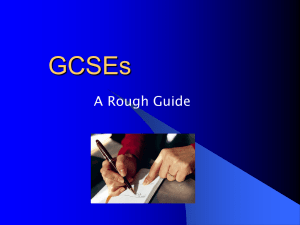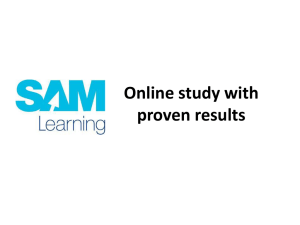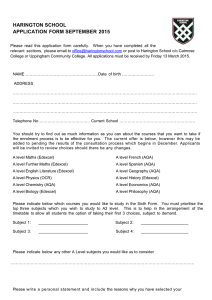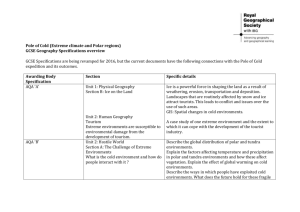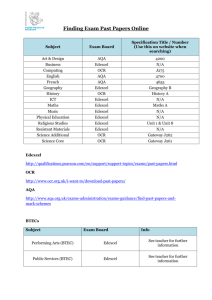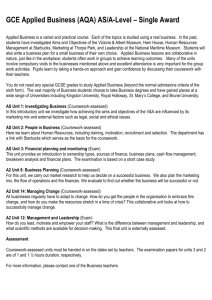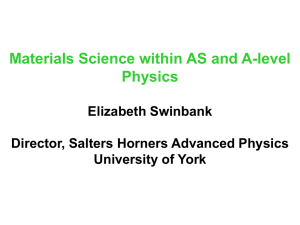to the GCSE Guide for current Year 10 students
advertisement
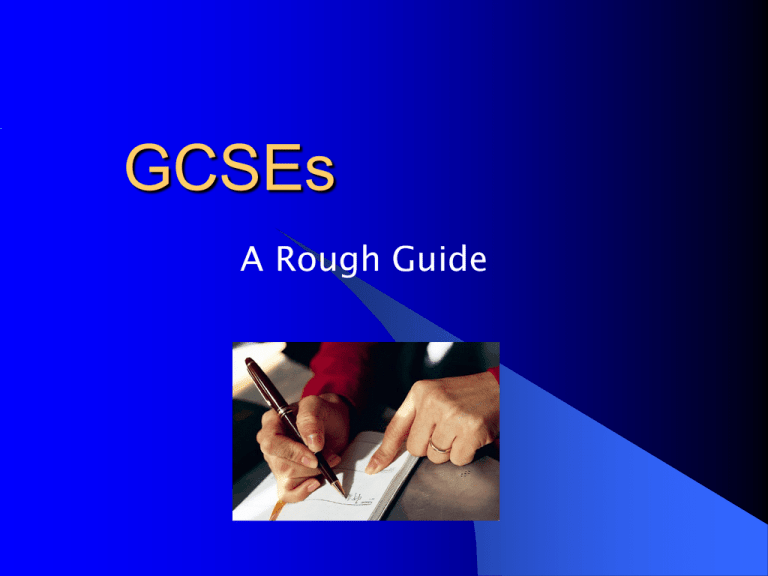
GCSEs A Rough Guide General Certificate of Secondary Education • • • • • • Most students take 9 GCSEs 6 from the Option Columns Maths, English, English Literature Latin as an extra Pass GCSE grades are considered to be from A*-C Grades D, E, F, G and U are considered to be ‘fail’ grades GCSE Results 2015 • • • • • • 90% A* - C A*/A = 46% B = 24% C = 20% 13 pupils (14% of cohort) clean sweep of A*/A Target for 2017! Exam Boards The exam boards we use are: AQA Edexcel OCR CIE Course Types • • • • The Heads of Department do the research and choose the courses they think are best for our students All courses are examined at the end However, some courses include controlled assessment or coursework Four types of course to choose from: Type 1: Final Exam • • These courses have no coursework or controlled assessment Examined at the end of two years Religious Studies (AQA) Latin (OCR) Type 2: IGCSEs • • These courses have no coursework or controlled assessment Examined at the end of two years Chemistry (CIE) History (Edexcel) Physics (CIE) Mathematics (Edexcel) !! Biology (AQA) Type 3: IGCSE English • • • • Language and Literature (2 separate exams) 50% examined 50% coursework Letter grades, not number grades Type 4: Exam / Controlled Assessment or Coursework • Art (Edexcel) • Geography (AQA) • ICT (AQA) • Modern Languages (Edexcel) • Music (Edexcel) • PE (OCR) • Design & Technology (OCR & AQA) What is Controlled Assessment? • • • It is a form of coursework with greater controls It is designed to measure subject specific skills Tasks are assigned different levels of control by the exam boards Levels of Control • • • High = Students are supervised; must work independently; must not communicate; must not be assisted. Medium = Students do not have to be directly supervised, but the teacher must be able to ensure the work is their own. Limited teacher input. Students may work together. Low= Work may be done outside of the classroom, students may receive teacher guidance, students may work together. Most assessments are in Year 11 • • However, ICT has a form of controlled assessment in every timetabled double lesson PE practical lessons also form part of the controlled assessment process Deadlines and Attendance • • • • Controlled Assessments are key elements to the GCSEs Deadlines must be met High control assessments should not be missed (mini-exams) Departments co-ordinate their own timetable and will inform pupils which lessons constitute controlled assessment and what level Absence • • • • If a pupil misses an element of controlled assessment, the department will try to make alternative arrangements However, too many missed assessments may jeopardise the GCSE All absences therefore need to be kept to a minimum If there are planned absences it would be wise to ensure there are no controlled assessments taking place Am I too late to change my options? • • • The answer is ‘no’ But if you are having concerns about your choices – speak to your tutor Any change MUST include either a telephone call with me or a note from home PSHCE • • Personal, Social, Health, Citizenship Education The year group is split into groups and for half of the year there is a rotation of: University choices/Careers/CVs Cooking Managing personal finances: credit cards/bank accounts etc. • The other half of the year includes a comprehensive course on issues related to health and personal development. The Website • • • • • • Under the label ‘Academic’ the following can be found: Homework Timetable The Option Columns Examination Administration (!) Controlled Assessments: timetable for different subjects (!) The Academic calendar which includes: The Reporting Schedule Parents’ Evenings School Exam dates 2017 Provisional Results Day: Thursday 17th August!!
